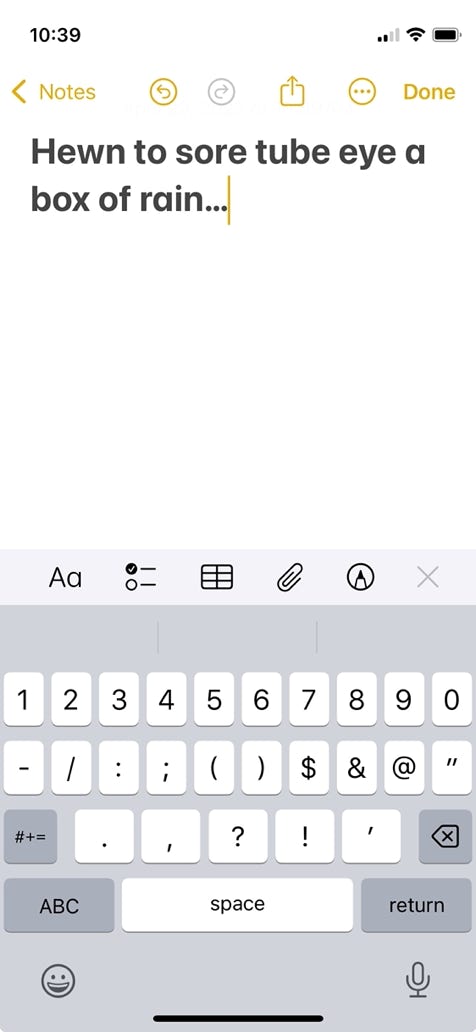02/18/2025
[While casting about looking for something unrelated, I stumbled upon this short snapshot that constitutes a note on process that was written waaaaaay back in 2012 and then stuck in the trunk. I might have been between blogs, I might have shrugged it off or set it aside. It’s basically nostalgia at this point, though Dragon Dictation lives on, albeit morphed into yet Another App With In-App Purchases. Also? The box of notebooks has only gotten bigger, but a couple have been transcribed. Progress is relative. —DJL]
April 24, 2012 – The Productive Time Equation
Lately, I've taken to walking two or more miles a day in an effort to ward off the sedentary effects of working from home. It's interesting how much casual exercise one gets in the office environment, between walking to various points in the office (printer, restroom, offices where co-worker harassment must take place) to getting out for lunch, plus the coming and going to and from the office. It adds up in ways that taking seven steps to the door to let the cat out or in never will.
But the addition of a walk has had the effect of reducing the surplus time in the day by an hour, on average, and the truth of the matter is that what typically gets trimmed out of the day to make way for putting one foot in front of the other is the act of putting words on paper. Not only do I have mad skills at dodging the heavy lifting of writing, but it's also a very easy thing to trim when I'm not going full-tilt-boogie on a story. There's plenty else that needs doing. Home improvement. Wedding planning. General life maintenance.
Unfortunately, the children get restless. You know how a child has the limitless capacity to stand before you when you're focused on something else and verbally beat you about the head and shoulders with your designation of "Dad", "Mom", or whatever your handle is until you wanted, as my mother used to say, to change your handle to something they couldn’t pronounce? Move that picnic inside your head, and you have what writers get from their stories when the stories feel neglected.
So last week, I set out on my walk at lunchtime and found myself mumbling bits of narrative and dialogue as I walked, working things out and while projecting that air of vague derangement that's popular among people navigating sidewalks without an apparent goal or purpose. And as I opened the phone's notepad, it dawned on me that somewhere, some iPhone acolyte might have created an app that would allow me to graft two layers of time atop one another.
Five minutes later, I was downloading the Dragon Dictation application onto my phone. Speech to text in the palm of my hand.
I've tried recording notes off the top of my head before — Apple was kind enough to build the app for that into the main offerings of the phone — and have used it quite a bit in the past for quick capture of ideas, bits, placeholders. The problem is I'm hell for actually transcribing those memos. They're sitting in iTunes on my laptop, waiting, probably asking the Roquefort Giant just how much of a slack-ass I can be. Of course, I have a similar problem with notebooks. LOTS of notes. Organizing them? If I do become a writer of note, post-demise some poor archivist is going to dig me up just to beat me to death a second time.
But voice recognition! Dictation! Rod Serling was a big fan of the Dictaphone when he worked on scripts. The ability to walk and talk is something I've had, for the most part, since my terrible twos. And Dragon Dictation was free, and highly rated. That's a lot of my favorite things all in one.
The very first thing Dragon Dictation taught me? That my diction could use a visit from Professor Henry Higgins. The second: if I speak slowly and annunciate in clear and precise tones, with a little bit of volume, it does an excellent job of capturing my voice and turning it into words. It doesn’t read stops or pause and punctuate accordingly, which is a drag, but under favorable conditions it rewards with clean text.
And therein lies the problem: combining walking at a three mile an hour pace and speaking clearly doesn't necessarily make a peanut butter cup you want to eat. You get breathy. You clip words. You're at the mercy of the ambient noise. And Dragon Dictation begins to think that "He went to the store" is "Hewn to sore" and you become your own personal language barrier. I don't know that much ground is gained if I look at what is spit out and can't recall what "donut car wall" was when I dictated it.
So I'm back to mumbling when I walk, and putting in mental (or note-padded) placeholders for when I get back to the keyboard, and trying to schedule a couple hours a couple times a week to do it the old fashioned way. Sure, Serling used a Dictaphone; but Walter Gibson used good old-fashioned finger-pounds of pressure to crank out The Shadow novels at a rate of two a month for several years.
But Dragon Dictation may still come in handy for dictating all those notebooks, or recapturing things without having to rekey them.
At least that reduces the challenge to being able to read my own handwriting.
© 2012 by Doug Lane
